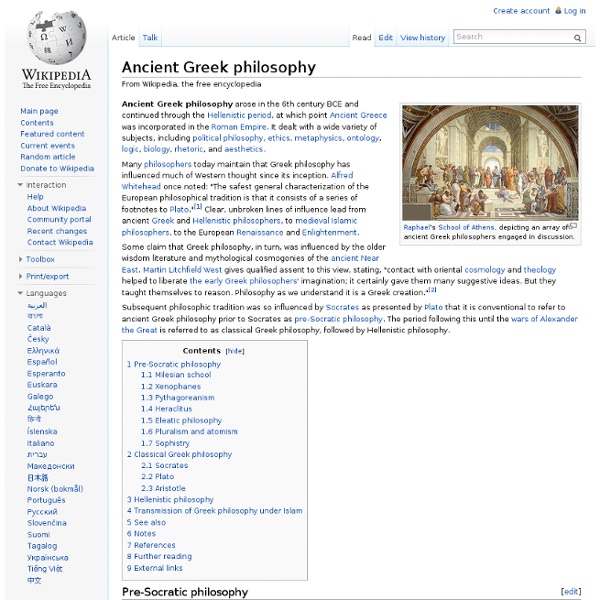



http://en.wikipedia.org/wiki/Ancient_Greek_philosophy
Related: - • -1Mathematician A mathematician is someone who uses an extensive knowledge of mathematics in his or her work, typically to solve mathematical problems. Mathematics is concerned with numbers, data, quantity, structure, space, models, and change. History One of the earliest known mathematicians was Thales of Miletus (c. 624–c.546 BC); he has been hailed as the first true mathematician and the first known individual to whom a mathematical discovery has been attributed.[1] He is credited with the first use of deductive reasoning applied to geometry, by deriving four corollaries to Thales' Theorem. The number of known mathematicians grew when Pythagoras of Samos (c. 582–c. 507 BC) established the Pythagorean School, whose doctrine it was that mathematics ruled the universe and whose motto was "All is number".[2] It was the Pythagoreans who coined the term "mathematics", and with whom the study of mathematics for its own sake begins. As time passed, many mathematicians gravitated towards universities.
Samos Regional unit in North Aegean, Greece Samos (,[1] also ;[2][3][4] Greek: Σάμος [ˈsamos]) is a Greek island in the eastern Aegean Sea, south of Chios, north of Patmos and the Dodecanese, and off the coast of Asia Minor, from which it is separated by the 1.6-kilometre (1.0 mi)-wide Mycale Strait. It is also a separate regional unit of the North Aegean region, and the only municipality of the regional unit. In ancient times Samos was an especially rich and powerful city-state, particularly known for its vineyards and wine production.
Ionians The location of ancient Ionia on the coast of modern-day Turkey. When referring to populations, “Ionian” defines several groups in Classical Greece. In its narrowest sense, the term referred to the region of Ionia in Asia Minor. Vegetarianism Practice of abstaining from the consumption of meat Vegetarianism is the practice of abstaining from the consumption of meat (red meat, poultry, seafood, and the flesh of any other animal), and may also include abstention from by-products of animal slaughter.[1] Vegetarianism may be adopted for various reasons. Many people object to eating meat out of respect for sentient life.
Pyrrha Deucalion and Pyrrha throwing rocks that become babies. Etymology[edit] In Latin the word pyrrhus means red from the Greek adjective πυρρός, purrhos, i.e. "flame coloured", "the colour of fire", "fiery red" or simply "red" or "reddish".[2][3] Pyrrha was evidently named after her red hair as Horace[4] and Ovid describes her as red haired. Mythology[edit]
Phoenix Phoenix most often refers to: Phoenix may also refer to: Mythology[edit] Pythagoras 6th century BC Ionian Greek philosopher and mystic Pythagoras of Samos[a] (c. 570 – c. 495 BC)[b] was an ancient Ionian Greek philosopher and the eponymous founder of Pythagoreanism. His political and religious teachings were well known in Magna Graecia and influenced the philosophies of Plato, Aristotle, and, through them, Western philosophy. Knowledge of his life is clouded by legend, but he appears to have been the son of Mnesarchus, a gem-engraver on the island of Samos. Modern scholars disagree regarding Pythagoras's education and influences, but they do agree that, around 530 BC, he travelled to Croton in southern Italy, where he founded a school in which initiates were sworn to secrecy and lived a communal, ascetic lifestyle. This lifestyle entailed a number of dietary prohibitions, traditionally said to have included vegetarianism, although modern scholars doubt that he ever advocated for complete vegetarianism.
Pyramus and Thisbe Plot[edit] In Ovid's Metamorphoses, Pyramus and Thisbe are two lovers in the city of Babylon who occupy connected houses/walls, forbidden by their parents to be wed, because of their parents' rivalry. Through a crack in one of the walls, they whisper their love for each other. They arrange to meet near Ninus' tomb under a mulberry tree and state their feelings for each other.
Quirinus In Roman mythology and religion, Quirinus ( kwi-RY-nəs,[1] Latin: [kᶣɪˈriːnʊs]) is an early god of the Roman state. In Augustan Rome, Quirinus was also an epithet of Janus, as Janus Quirinus.[2] His name may be derived from the Sabine word quiris "spear". Etymology[edit] Rhea Silvia The legend[edit] Romulus would go on to found Rome, overthrow Amulius, and reinstate Numitor as King of Alba Longa. In Roman art and literature[edit] In a version presented by Ovid,[7] it is the river Anio who takes pity on her and invites her to rule in his realm. Pygmalion Pygmalion or Pigmalion may refer to: Mythology[edit] Stage[edit] Film[edit] Music[edit] People[edit]